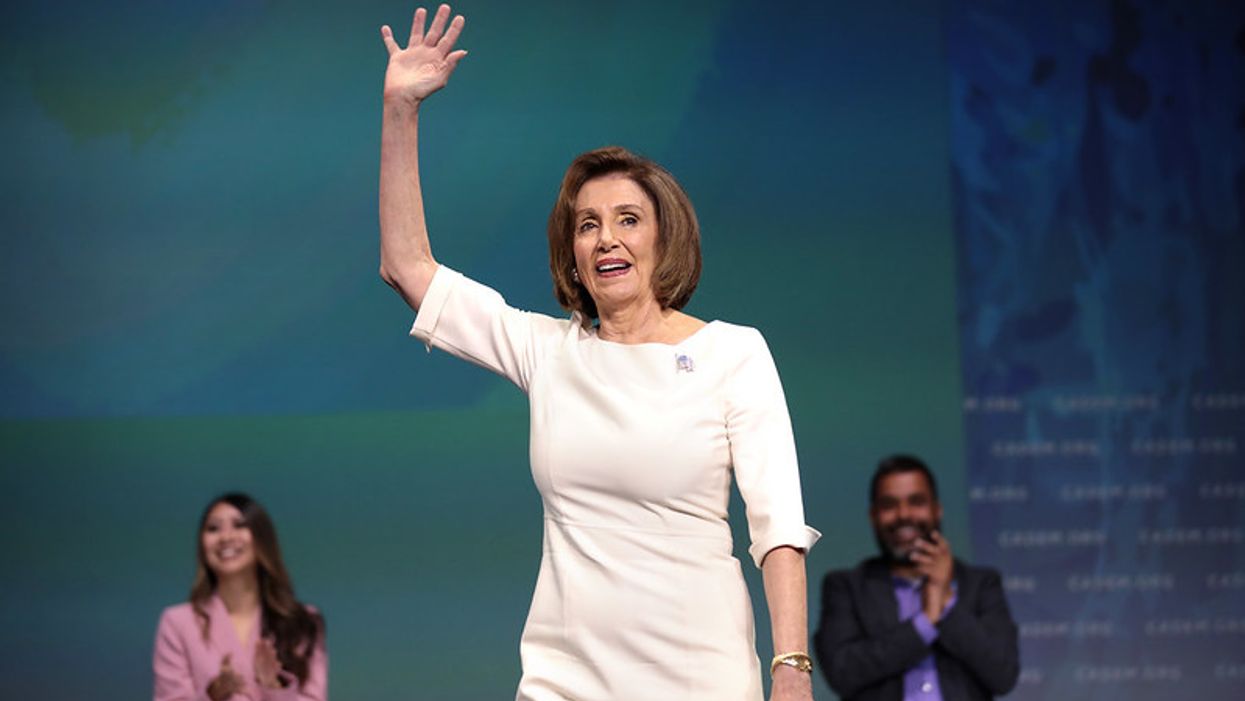Pelosi Triumphs With Passage Of CASH Act Mandating $2000 Relief Payments

House Speaker Nancy Pelosi scored a big win on Monday night when the CASH Act, which would increase direct payments to individuals included in the recent coronavirus relief package from $600 to $2,000, passed the chamber by a 275-134 vote.
Though Pelosi and the Democrats hold a solid majority in the House of Representatives, this bill required a two-thirds majority to be approved by the chamber because it was moved under a process known as suspension. It wasn't clear the act had enough votes to pass, though she made clear she would keep fighting to pass it even if it failed.
"We will pass this bill today either under suspension or under a rule where it just requires a majority vote," she said. "I do think the American people would love to see that unity on their behalf."
But the speaker was able to spur 44 Republican members to break ranks and support the measure on Monday evening.
So while she showed that the Democratic Party largely stands behind calls for Americans to get more support — not less — during the pandemic, she also split the Republican caucus. And even by exposing the cracks in Republicans, she stilled showed most of the party is against the plan to give help to American families — even a plan supported by President Donald Trump.
That's not necessarily a massive coup for her, but it starts 2021 off on favorably footing, even as her caucus is set to shrink substantially. Her party is almost entirely united behind a popular issue, and her opponents are fractured. As soon as Trump announced he might block the bill and demanded the $2,000 payments, Pelosi jumped at the opportunity he had presented. Since it wasn't clear the bill could pass the two-thirds threshold, the plan is working out even better than she might have hoped.
But will the bill actually become law? Will Americans get $600 checks instead of $2,000?
That's far less clear. To become law, the Senate must now take up the bill. Under normal circumstances, it would be safe to assume that Senate Majority Leader Mitch McConnell wouldn't even consider bringing the legislation to a vote. He hates bringing up tough bills that split his caucus, and he hates capitulating to Nancy Pelosi.
But by backing the measure, Trump has put McConnell in a tight spot. Control of the Senate for the next two years hangs in the balance as voting continues in Georgia Senate runoffs scheduled for Jan. 5. If Democrats win both seats for the state, the Democratic Party would control the chamber, thanks to Vice President-elect Kamala Harris' power to cast tie-breaking votes.
Democratic candidates Jon Ossoff and Raphael Warnock have been hammering Republican Sens. Kelly Loeffler and David Perdue over the direct payment issue in the fight for the two Senate seats. Loeffler and Perdue had touted the passage of $600 payments that have since been slammed by the president as insufficient, while Ossoff and Warnock have vehemently supported the higher payments.
If McConnell just wants to block the bill to increase the payments, he can. But he risks putting Loeffler and Perdue on the defensive a week before the day of the runoffs, since their seats will determine whether McConnell remains majority leader. It's also not clear if Perdue and Loeffler really are enthusiastic about the more generous level of direct spending on families, but it seems unlikely they would want to oppose the popular measure right before Georgia voters cast their ballots.
But if McConnell brings it to the floor, will it pass? Senate Democrats are expected to support it. And some Republicans, such as Sen. Marco Rubio of Florida, have voiced support for the measure. Along with Perdue and Loeffler, and a handful of other sympathetic GOP senators, it's possible there'd be enough votes for it to pass. But it would infuriate some members of the GOP caucus, such as Sen. Rand Paul of Kentucky and Sen. Ron Johnson of Wisconsin, who vehemently oppose the idea on principle.
McConnell and the Senate GOP may try to find some poison pill to attach to the bill to prevent Democrats from supporting the measure, such as the creation of a voter fraud investigation or repeal of Section 230 to appeal to Trump's personal grievances. But these shenanigans may just emphasize that the Republicans aren't focused on enacting support for American families; they are just playing games instead.
Despite all this, it's not certain the fight falls out in Democrats' favor. While all the dynamics and popular opinion seem to support the Democratic Party's position and thus bolster than chances of Warnock and Ossoff in Georgia, voter behavior can be unpredictable. It's not clear that the people casting their ballots will interpret the series of events in the way they're perceived by people in Washington, D.C. Perhaps voters will have been successfully convinced by Trump that the $2,000 payments were his idea, and they'll show support for him by voting to send his allies, Perdue and Loeffler, back to the Senate.
Those uncertainties, aside, however, it's clear that events are playing out just as Pelosi had hoped, while McConnell has been roiled.
- Desperate Millions Await Covid Relief While Trump Golfs With Graham ›
- Pelosi Battling Trump And McConnell Over Pandemic Relief ... ›
- Pelosi Calls Trump's Bluff On Threat To Veto Covid Relief - National ... ›








